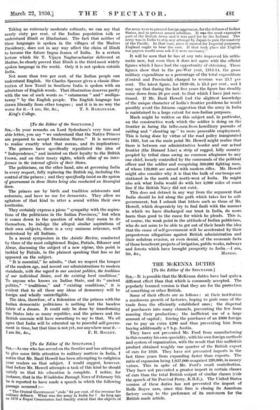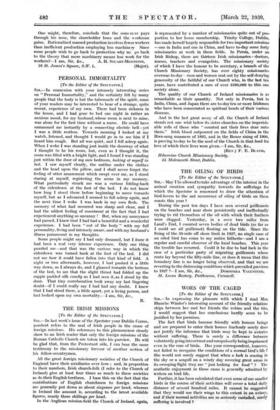THE McKENNA DUTIES
[To the Editor of the SPECTATOR.] Sin,—It is possible that the McKenna duties have had quite a different effect than that which is commonly accepted. The popularly boomed version is that they are for the protection of something or other British.
Some of their effects are as follows : at their institution a mushroom growth of factories, hoping to grab some of the trade from the efficiently established ones ; the dispersal of purchasers into many channels, preventing the few from massing their production ; the inefficient use of a large amount of capital ; forcing the purchaser of an £800 foreign car to pay an extra £200 and thus preventing him from buying additionally a 7 h.p. Austin.
They have not prevented Mr. Ford from manufacturing in this country his own speciality, with his own foreign methods and system of organization, with the result that this unBritisli product obtained roughly one quarter of the British export of cars for 1929. They have not prevented imports in the last three years from expanding faster than exports. The ratio of expansion being 1,057,000 as against 220,000, in money values. This in spite of Mr. Ford's small contribution. They have not prevented a greater import in certain classes of cars than the total British output of similar classes (vide the speech of Sir Percival Perry, K.B.E.). The United States version of these duties has not prevented the import of Rolls Royce cars, since this firm is closing its American factory owing to the. preference of its customers for the British made article.
One might, therefore, conclude that the eons in- er pays through his nose, the shareholder loses and the vA orkman gains. Rationalized massed production involves fewer workers than inefficient production employing less machinery Since some people wish to go back to protection -why no go back to the theory that more machinery means less work for the
16 St. James's Square, S.W. 1. (Major).



















































 Previous page
Previous page